by Jenny Rose | Dec 17, 2022 | A Flourishing Woman, The Journey
I’m pausing. It wasn’t, I hasten to say, my idea! However, after an interesting and stressful concatenation of events I’ve decided to embrace the opportunity to pause.
It all started with a wonderful post from one of my favorite Substackers, Lani Diane Rich. It’s titled “Emotional Ex-Lax.” Honestly, how could anyone not go look at that post?

Photo by freddie marriage on Unsplash
The post suggests an exercise in blind journaling. I journal daily, first thing in the morning, with my first cup of tea. I don’t go on line first. I don’t work in the house, or start breakfast, or make my bed, or clean the cat boxes. I feed the cats (because if I don’t I won’t be allowed to sit peacefully and journal). I pee. I turn on one low light. I heat water and make tea. Sometimes I put on very low music. Sometimes I light a candle or two. At 5:00 in the morning there’s nothing going on. Darkness presses against the windows. Nobody needs anything from me. I’m free, and something of sleep’s twilight lingers. I sit with my laptop, open a new document, and start typing. Every month I delete the last month’s journal entries. I never look back at them. They’re for no one else’s eyes. It’s an entirely private space.
If, for some reason, I miss this time with myself, I notice it immediately. I’m not as centered. I feel more anxious. I feel more stressed. If I can’t get to a word processor, I journal with pen and paper, and then destroy it.
I never thought of blind journaling, though.
I recognized resistance. As I peeled the resistance away, I discovered the roots of it: perfectionism. That made me mad. I’ve worked so hard to uproot that toxic growth, but I never seem to get it all eradicated. It’s like bindweed, that bane of gardeners. Out in Colorado, where I used to live and garden, bindweed choked the dry landscape. Its roots can grow 6 feet deep. Any attempt to dig it up or kill it above ground merely encourages it. It grows fast. Herbicides don’t work. Its folk name is ‘Devil’s guts.’ A perfect description.
I think about perfectionism as bindweed.
Even as I journal, I edit. I correct spelling. I make sentences and paragraphs. Sometimes I even cut and paste. For a journal no one else will ever see and I won’t read again. For a journal document I’m going to delete in four weeks. If I blind journal I can’t edit as I write.
It won’t, God help me, be perfect. It won’t even kind of be perfect. I’m a good typist, but I make mistakes. Sometimes the cursor jumps around. Sometimes my sentence structure is poor.
Unacceptable.
So, naturally I made up my mind to try blind journaling, to challenge my perfectionism if for no other reason.
I chose a day off and journaled the usual way for a bit, then set a timer for 20 minutes, shut my eyes and blind journaled. I thought I was already emptied out, but wow. I was in full flood when the timer went off, and it felt like I’d only been doing it for five minutes. I loved it. I knew I was making mistakes (which I refused, by the way, to go back and fix!), but they didn’t interrupt my process. I just kept going, never looking back, never losing the thread of what I was saying. No visual distraction whatsoever.
I didn’t want to stop.
Well!, I thought. This will be a fun thing to blog about.
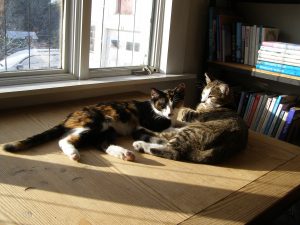
Izzy & Ozzy; Fall, 2020
I picked up my 16-ounce cup of tea, pomegranate green this season. Our little calico cat, Izzy, who had been snuggled in her favorite position in my armpit, woke up and decided she wanted to be in my lap where the laptop was. I pushed her away. She came back. I pushed her away. She started chewing on the upper corner of the screen, an obnoxious habit she has. I pushed her away with more irritation this time. The tea I was holding slopped onto the keyboard. I cursed, wiped it away, tipped the computer and let it drip out. I got a couple of Q-tips and dried around the three or four keys that got splashed. I sat down again to go back to my peaceful morning journaling.
The computer died.
Shit!
I plugged it in in case the battery was run down, but I knew it wasn’t. I let it be for an hour, then tried to turn it on.
Nothing.
When the computer store opened, I got in the car and took it over. Mark, my computer guy, shook his head. I left it in his capable hands.
Now my quiet day off, in which I didn’t have to go anywhere or do anything but noodle around at home, had turned upside down. My serenity fled. My excitement about starting a rough draft of a post on blind journaling withered. I couldn’t pay bills and deal with money, always a major stressor. Speaking of money, replacing my laptop would cost over $1,000. And what would repairs cost? And how much money do I have in savings? In checking? I couldn’t check! Panic until I remembered my cell phone is connected to the Internet. I couldn’t write, at least not with a word processor.
But none of that was the worst thing. The worst thing, and I’m completely mortified by this fact and would prefer to hide it from both myself and the world, was I couldn’t play solitaire!
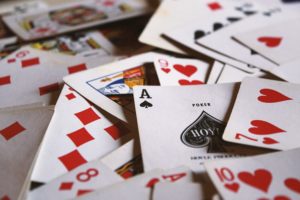
Photo by Jack Hamilton on Unsplash
This realization was so unwelcome I longed, craved, itched to play a few games of solitaire and “think about it.” Except that’s a lie. I wanted to play solitaire so I could numb out.
I roamed around the house, restless, wanting to crawl out of my own skin. The day I had looked forward to suddenly seemed dull and endless. I didn’t want to read. I didn’t know what to do with my anxiety. I started waiting for the phone to ring with news of my machine.
I did eventually get a grip but I recognized the symptoms of withdrawal from an addiction, and I didn’t like it. I kept myself busy with several tasks I’d been putting off. I cut greens I’d gathered with a friend a few days before and decorated for Yule. I pulled out a notebook and continued journaling, off and on, long hand. It gave me a sore hand, but it helped. I told myself I could rough out a blog post long hand, too. But it was probably not worth it. I’d have my laptop back by the end of the day. Probably. Maybe. Wouldn’t I?
I set aside the budget and a couple of bills I’d just received and weren’t due for a week or more. I tried not to think about money, or scarcity, or money.
Not thinking about money – la, la, la-la – fingers in my ears and eyes squinched shut.
I tried not to think about my email piling up. I read some of it on my phone, but the screen was so small it wasn’t much fun.
I thought and journaled about how busy I always feel, how often I hear myself say I’m tired, how overwhelmed I feel. I’ve been telling myself feeling overwhelmed is natural. I work; I run a blog and a Substack page, publishing on both every weekend; I’m writing another book; and now I’m co-manager of a long-distance situation in which a loved one is recovering from a broken hip and sinking into dementia. I anticipate making the long trip from Maine to Colorado and back again at some point during the holiday season, running the gauntlet of weather, travel complications, crowds, and various respiratory viruses. Oh, and spending money I don’t have. Especially if I have to replace my laptop.
Of course I’m overwhelmed.
Yes, said a snarky little voice in my head, “and how much time and energy does it cost you to play solitaire in all the pauses, cracks, and crevices of your life? What about visual stimulation? What about your problem with speeding? What about your anxiety? You’re not helping your anxiety, you’re feeding it!
The day passed and the computer guy didn’t call. The next day was a work day. Normally I would have been working on posts for the weekend ahead. I was beginning to feel behind. If I didn’t get the laptop back I wasn’t going to be able to post. Less than perfect. Inconsistent. Letting my readers down. Everyone would probably unsubscribe. Even if I got the laptop back, the weekend was going to be tight. Starting from scratch on Saturday morning for Harvesting Stones and on Sunday morning for Substack takes a lot of hours out of my weekend, when I also run errands, clean, do laundry, cook for the week ahead, and take care of business I haven’t had a chance to do during the week.
And I was already tired. Already wanting those two days off, not to fill up, but to relax in. Could the solitaire really be feeding my anxiety rather than calming it, I wondered?
Yes.
But –
Yes, your solitaire habit is feeding your anxiety. You know it.
Shit!
At the end of the day, I called my computer guy. He informed me my machine was disassembled and he’d been running a fan on it night and day. He didn’t know if it was a goner or not; he wasn’t going to put it back together and plug it in until he was sure every molecule of water was gone. He told me, rather pointedly, he’d call me.
OK, I thought. I won’t post this weekend. Nobody will care but me. I’m allowed to take a weekend off. I read all kinds of people who take frequent breaks and pauses. I don’t think any the less of them for it; in fact, I admire their self-care and confidence.

Photo by Alex Iby on Unsplash
Friday happens to be my nine-hour day at work, so I wouldn’t have used the laptop much that day in any case. I gritted my teeth, used a computer at work to catch up a little, and tried not to worry too much. I never play solitaire at work, so it was my third day without it.
Meanwhile, I made and received long distance calls from the facility where my loved one is recovering physically and wandering mentally. I finished the book I was reading and started another. I journaled a lot in my notebook. I played with the cats, giving them my full attention, which felt nice. I noticed what I was eating and enjoyed the taste of my meals, unusual for me. I savored my tea more. I wrapped a few Yule gifts and got them in the mail. I did some cleaning. I exercised. I put on an old movie and did upper and lower body resistance training in front of it rather than playing solitaire.
I slept well. I felt less exhausted. The inside of my head was quieter. I even took a nap, a thing I don’t normally do, as playing solitaire is “resting.” (Uh-huh. Whatever you say.) My anxiety ratcheted way down. I had a couple of crying jags, but they passed and I felt relieved rather than more upset when they were over.
I had more time.
I have more time because I’m not writing without my laptop, I thought.
“No. You have more time because you’re not playing solitaire in all the cracks and crevices,” said the snarky voice.
On Friday, while I was at work, my laptop was resurrected and my partner brought it home. What saved its life, I am told, was there was no sugar in the tea. Who knew?
By Friday evening, when I returned home from work, I’d made some decisions:
- No more solitaire.
- No more liquid in close proximity to the laptop.
- Take the weekend off. Really take it off. No pressure to post and publish. No solitaire. Embrace the pause. Make it last. Feel about things. Think about things. Be present.
All weekend I had the half delighted, half guilty feeling I was playing hooky. I ran several errands. I journaled on the word processor. I dealt with receipts, bills, accounts, the budget. I did some cleaning and laundry. I read. I listened to music. I watched a couple of movies and exercised. I played with the cats. I texted with a friend. I talked to my loved one and their nurse in Colorado. I made a new recipe for a pork shoulder in the crock pot which made the house smell like citrus, garlic, and herbs. I read several inspiring pieces from the Substackers and minimalists I follow. I started making notes for this post, which flowed into writing a rough draft.
It was a good weekend. It didn’t feel too short or too rushed. I didn’t feel pressure or anxiety. I slept well.
I’ve realized it’s time to make some changes. It’s a good time of year to reevaluate and do that, right? I didn’t set out to do it, but once it was forced upon me I realized I’ve been running a little faster every day for a long time, feeling a little more tense and anxious, and needing a little more numbing to manage it all. I’m grateful I was forced to stop. I’m going to start moving again, but in a different way, with slightly new priorities and without the damn solitaire!
(“You’ve finished the post!” says the snarky voice. “You’re way ahead this week. Wouldn’t you like to relax, play a game of solitaire, and celebrate?”
Oh, shut up!)
Questions:
What’s your favorite numbing activity?
On a scale of 1 (hardly any) to 10 (all), how much of your power does it have? Are you uncomfortable about the level of power your habit has over you?
Does your habit increase your anxiety?
Does your habit decrease your focus?
Have you ever formally kept track of the time you spend doing your favorite numbing activity?
Leave a comment below!
To read my fiction, serially published free every week, go here: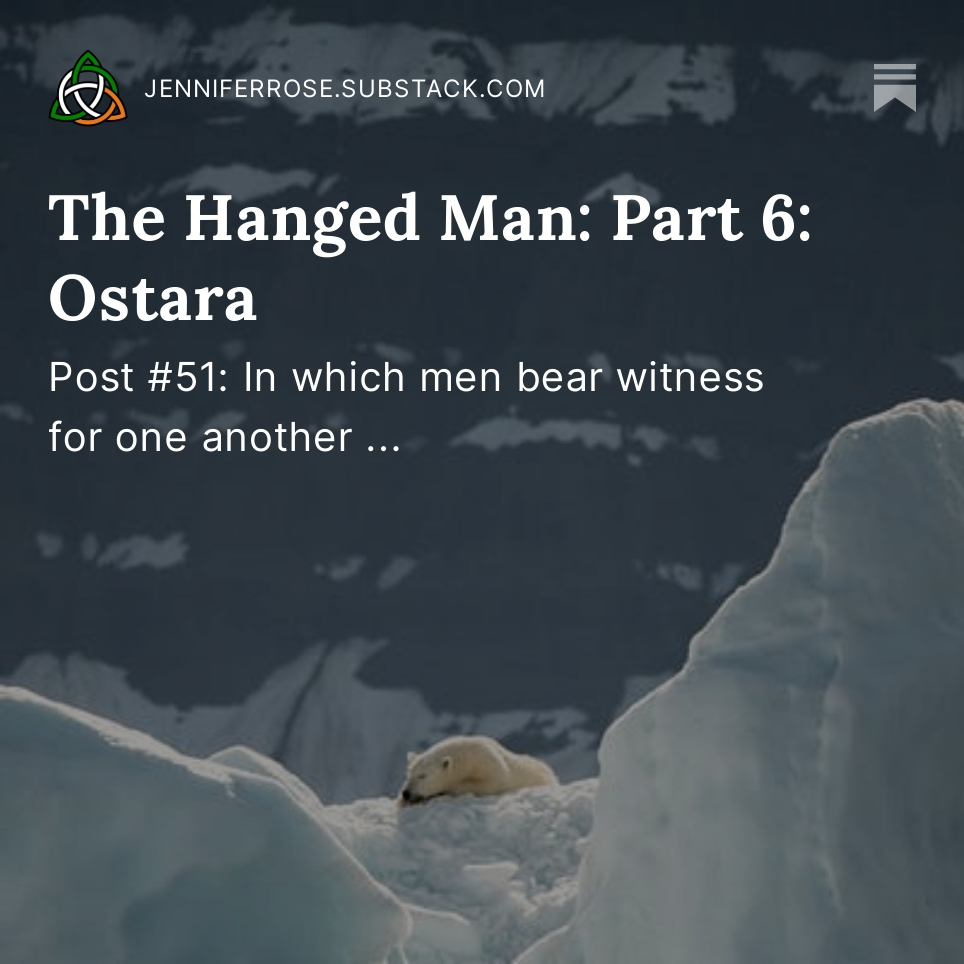
by Jenny Rose | Sep 24, 2022 | A Flourishing Woman, The Journey
As I’ve thought about this post, I realize the theme of being lost and found is a thread running through my life and my writing. Years ago, when I was first introduced to Clarissa Pinkola Estes and devouring everything I could find by her, she used a phrase I’ve never forgotten: everything lost is found again.
Everything lost is found again.
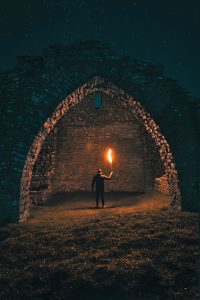
The possibility of that truth gave me deep comfort, something I badly needed in those days.
Maybe we don’t find all the things we lose in our lifetimes, and maybe not in our deathtimes. But maybe someone else finds what we lost. Or maybe what we lost comes back to us looking so different we don’t recognize it. Or maybe what we lost is not truly lost at all. We carelessly leave things behind, or we amputate them, or we deny they were ever there in the first place. We fear we’ve lost them. We try to lose them. But maybe they never really leave us, they just hide somewhere in the attic of our minds until we need them. We ascend the stairs, enter the musk and debris of years, all the broken, aging, outdated and rejected parts of our lives and ourselves mouldering together in cobwebs and dust.
I like to imagine that.
I’ve posted before about being lost and found. I went back and read it as I worked on this post, so as not to be repetitive. That post was a seasonal meditation on the nature of change. I didn’t explore it quite from the angle of losing to find.
I came across a quote recently from Kristin Martz: “We lose ourselves in the things we love. We find ourselves there, too.” It made me smile, and think about the parts of my life so deeply absorbing I am self-forgetful as I live them. My head is empty. I am pure being, without self-consciousness or anxiety. Time does not exist. I feel a kind of boundary ecstasy, an awareness of connection to everyone and everything, an essential and lovely part of some greater whole.
Perhaps during such times we lose all the crust, the armor, the accumulation of useless and punishing junk we’ve somehow picked up or been taught, and are pared down to who we really are in our souls and spirits.
Many of us don’t want to let go of our junk, though. It’s been with us so long it forms part of our identity, part of our story, and we don’t want to let it go. Then who would we be? How would we recognize ourselves? What might change? What different or challenging things might we be required to do? We don’t take the leap into anything we might lose ourselves in, so we never fully find ourselves, either.

Photo by David Hofmann on Unsplash
Maybe the times in life when we truly feel we’ve lost it all are also the times we’re finding unimaginable grace and meaning.
It’s a circle, a natural life cycle, an ebb and flow of experience.
Another thing I came across somewhere years ago is the idea of an older, wiser version of ourselves, always at our shoulder supporting, advising, guiding, and cheering us on as we journey through our lives. I often make a picture of it in my mind, myself as an old (well, older!) crone, holding my hands out to a younger, struggling self the same way I hold my hands out to children I’m teaching to swim.
“You can do it. I’m right here. I won’t let go of you. You’ve got this! Now … swim!” Or jump. Or put your face in the water.
“Risk,” my elder self says, “dare, follow your heart, do what you need to do for yourself. Go ahead, write, it, dream it, imagine it, enjoy it. Be happy. Play. Rest. This is the way forward.”
And, “I believe in you.” That’s what I most long to hear.
I know it’s terribly cliched, but lately I’ve been thinking about what life means. Does it mean anything? Can anyone say what it means, or must we all make our own meaning? I lean toward the latter. I’ve wondered before what life is for, what I am for, but always in soul-dark times. This is not a dark time for me. In fact, I’m gradually coming back into the light. Now the question is a curiosity, a toy, and my answers are not concrete, not a vehicle for getting through another day, but more intuitive and less formed into language.
I keep going back to that quote: “We lose ourselves in the things we love. We find ourselves there, too.”
Losing everything to find something. There’s some kind of deep truth in that my intellect can’t quite grasp, but my spirit does.

Photo by Cristian Newman on Unsplash
I wonder, with an inward smile, if that’s not my answer for the meaning of life. Finding myself, however that happens. Paring away all the scar tissue and junk, losing and losing and losing the people and places I thought were part of my identity, along with objects, money, youth, innocence, and countless other small, ordinary losses we all experience until the best, most extraordinary me is revealed. Wouldn’t it be ironic if the meaning of life is nothing more than to immerse ourselves in it, cherish our physical experience and pleasures, give ourselves to those activities in which we lose ourselves …
… and find ourselves?
No philosophy. No agonized handwringing or intellectual labyrinths. Just body, soul, joy, and loss. And discovery on the other side of loss.
Maybe the meaning of life is simply to live.
by Jenny Rose | Jun 26, 2022 | Connection & Community, Emotional Intelligence
This tidbit landed in my Inbox this week. At first read, I simply agreed with it. As I’ve thought about it, though, I keep unpacking layers.
I’m sitting outside in the sun at our new house writing the old-fashioned way with a pen and paper on my knee, which is crusted with dirt. The knee, I mean, not the pen and paper! It’s too bright for my laptop out here. Inside, our plumber and his assistant are deconstructing our upstairs bathroom. Fortunately, we still have a dumpster. We are pleased to have our plumbing issues addressed: slow drains, old water damage, leaking pipes, and an unpleasant whiff of sewer now and then. We will be even more pleased to have a working shower.

Photo by Angelina Litvin on Unsplash
And it all costs money. A lot of money.
With no work as a distraction on this day off, I spent the morning in the garden, where I was thoroughly happy and busy. That took care of the morning. I got dirty (knees) and bug bitten. We have no water at the moment, so I’m going to stay dirty until the plumbers leave for the day, although, come to think of it, I don’t know the water will be turned back on when they leave. Hmm.
Anyway.
Near noon I went inside for shade and a cold drink, but the sounds of banging, sawing, and the shop vac, along with a steady stream of construction debris and old bathroom fittings being carried down the stairs and out the door on the way to the dumpster fueled my anxiety, so I turned to the comfort of writing, as I so often do. I started by catching up on my email, where inspiration frequently lurks.
It was then I read Godin’s brief thoughts about fear and footnotes. He suggests when we feel nervous and afraid about the “information” we’re writing or speaking about, we don’t show our sources, references, and work.
It made me think about my own fear about scarcity today. If I showed my work about that, about the fear I’ll run out of money and have to spend the rest of my life under a bridge, what would it look like?
Have I ever lived under a bridge?
No.
Have I ever been in serious want?
No.
Have I ever been homeless or truly hungry?
No.
Do I have a job I love and for which I’m paid?
Yes.
In essence, I have no work to show because my fear of scarcity is nothing but an old ghost, an ancient traumatic wound, irrational and mostly in my head.
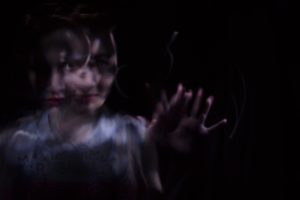
Photo by Mar Newhall on Unsplash
Interesting. Does lack of research and background information indicate a measure of fear in our discourse, a measure of uncertainty, a degree of irrationality, even?
Perhaps.
It’s a fact that I like my information (facts) served up with links, references, and footnotes. Content presented as information (facts) without such foundations is suspect in my eyes, and I do further research. Far too many people in cyberspace call their opinions, pathologies, disorders, fetishes, and lies facts.
On the other hand, some information (facts) is so widely accepted, taught, and promulgated footnotes are hardly necessary. An example of this is diet. Much of our (broken) healthcare system is built on the foundation of “facts” about what constitutes a healthy and appropriate diet.
But what if these “facts” arise from corrupted data? What if the real truth is less profitable for those in power and thus has been buried? For decades?
Collecting data and testing hypotheses requires funding. Doing it well requires a lot of funding. Corporations and other entities with deep pockets may have a vested interest in the outcome of studies. It’s not impossible to imagine unpalatable findings (by which I mean findings which threaten profit) are buried or deleted. It’s also not hard to imagine studies designed to explore data contradicting the (profitable) status quo can find neither funding nor support in the most powerful scientific schools and journals.
An unhealthy population is enormously profitable for some people, and those people have a lot of power.
This sort of thing has, after all, been going on since the time of Galileo, the sixteenth century astronomer who was interviewed by the Inquisition, forced to recant his scientific findings, and spent the end of his life under house arrest.
The thing is, he was a scientific genius, and he was right.
But the Catholic Church, very powerful during that period of history, felt threatened by his conclusions.
In other words, they were afraid. So they shut him up. Fear = silencing.
But that doesn’t change the fact that he was right.

Photo by Brenda Godinez on Unsplash
Tens of thousands of articles are available online about the health benefits of a plant-based diet. The better written, more thorough ones contain resources and links to various studies and data. However, one can also find studies and data by well-qualified scientists and doctors (mostly in other countries) indicating the reverse: a plant-based diet may cause a myriad of health problems.
Critical thinking, the ability to assess a problem or question, research, look at data, ask questions, and analyze findings, is an equal opportunity playing field unless we have no access to information (like the Internet) or are unable to read and write. What this means to me is we all have a right to question information, research for ourselves, and look for a variety of sources and references. Critical thinking in the modern age means we must be able to separate a fact from an opinion, information (facts) from lies.
That’s a big problem. I’m quite confident a plant-based diet caused me years of health problems and pain and the biochemical results (demonstrable data) my current carnivore diet provides to my doctor are not dangerous or problematic. My healthcare provider disagrees. Vehemently. I want to talk about my research, resources, and links. I want to ask questions. I want resources my provider might have access to which I haven’t found or don’t know about. I believe I have some solid data to back up my questions and concerns. I also know I am frequently wrong, and I’m as susceptible as anyone else to the glamour of bullshit wrapped up in science.
My healthcare provider refuses to discuss it.
So there we are. I’m not afraid to be wrong, but I am afraid to be in pain. My healthcare provider is part of a broken system. How much power does she have, really, to deal with someone like me? How much time does she have? How much energy or even interest? It’s much easier to fill out a one-size-fits-all prescription for a plant-based diet or pharmaceuticals. Her job may be in jeopardy if she doesn’t feed me with the medical establishment’s current party line.
Meanwhile, in the eyes of some others, I’m murdering the planet, taking poor care of my health, and clearly believe in hate and violence toward animals. Any self-respecting member of PETA would set my house on fire.

Photo by Lukas Budimaier on Unsplash
None of that is true, from my perspective. None of it is even fact. I could provide several links and resources challenging those statements, many of them by scientists and including studies and data. But many, many, people would believe all those things and more about me based on my dietary choices, and they too could provide links, resources, and numerous studies and scientific conclusions supporting their point of view.
I agree with Godin. We should show our work. It won’t make everything magically clear because information from different sources frequently conflicts, and not all information sources are trustworthy, but showing our work helps us remember science is built on the shoulders of those who came before us (like Galileo), and honors the scientific process. Heck, it honors creative process. Godin’s original post is three lines. I just wrote more than 1,000 words because he poked at me and made me think, explore, question, wonder.
We are all connected, whether we like it or not. Showing our work makes us a little more human, a little more humane, a little more thoughtful, a little more careful. People who won’t show their work set off my radar. What are they hiding? Why don’t they have the courage of their convictions? Why are questions and investigations so threatening they must be silenced or stopped?
As for the inside of my own head, I need to show my work to myself, too. Anxiety thrives on the stories we tell ourselves without regard to whether the stories are true or have ever been true. We all need to be clear about the difference between our stories and opinions and information (facts). Stories and opinions have their place, but they’re not facts we can research, footnote, and independently verify. If we can’t show our work, perhaps we’re no longer in the realm of facts. If we won’t show our work, we lose credibility with people who think critically.
Updating a bathroom costs some money. We have some money. Those are the facts.

Photo by Anastasia Zhenina on Unsplash
by Jenny Rose | Jun 4, 2022 | Power
All my life, when I tackle a problem or a challenge, if I don’t succeed I assume it’s about me. I’m not fill-in-the-blank-enough. I’m a failure. So, I work harder. I perseverate. I obsess. I refuse to give up. I try, and I try, and I go on trying until I’m used up, and then I try some more.

Photo by Hailey Kean on Unsplash
Every now and then I get jarred into a wider perspective and I suddenly understand some problems can’t be solved. Some challenges can’t be mitigated. Sometimes the change I’m seeking is not possible. This happened recently with a short note from Seth Godin in my Inbox titled “The Win-Win Fallacy.”
I’ve studied power dynamics for several years now, as regular readers know. One of my most important filters in evaluating others is whether they come from a power-over (win-lose) or power-with (win-win) perspective. This discernment is not necessarily loaded with judgement. In some cases, power-over is both effective and appropriate. In terms of personal relationships, though, I’m not eager to engage with people working for power-over.
The invisible problem (to me) with this filter is I haven’t thought of it as a continuum. I’ve thought of it as two isolated positions. You’re one, or you’re the other. (You’re with me or you’re against me.)
I abhor black-and-white thinking. Way too much of it in the world. It’s always a trap, and it always feels manipulative. Maybe one of the reasons I dislike it so much is I’m so prone to it myself. It sneaks up on me, completely invisible, and I’m chagrined when I realize I’ve fallen into it. Again. Aargh!
These few sentences from Godin point out many problems don’t have a win-win solution, especially problems that have been around a while. If there was a win-win, someone would have found it. Think about gun control, for example. (I know, I don’t want to think about it anymore, either, but our children are going to keep dying in schools until we figure it out.)
Maybe it’s not that I’m too stupid to find the win-win in any given situation. Maybe there isn’t one.
Maybe some problems can only be solved on a continuum of sort-of-win, sort-of-lose, or even definitely win-lose, at least in the short term. Maybe, as Godin points out, what we should work for is something better than we have now, a situation in which most people are happier than they are with the current status quo. This, by the way, is what’s known as compromise.

Photo by rawpixel.com on Unsplash
Time changes things. I’ve often lost in the short term but won in the long term, or vice versa. Winning and losing are relative positions, a snapshot of one moment in time. They can and do change. (A private prayer of thanksgiving here.)
We are obsessed with winning in this culture. We’ll kill others and/or ourselves in order to be right. We’ll lie, cheat, and steal to ensure we win. We elevate winners with power, money, and authority. Some people are unable to accept losing anything, ever.
People who operate from this perspective are unable to discuss, negotiate, or compromise. They have no interest in the price of their win, as long as they get it. They don’t care who loses, who suffers, who dies. They don’t care about justice. The win is all. Nothing else matters.
Then there are people like me who are convinced justice (always assuming we can identify and agree upon what’s just!) is desirable and achievable and must prevail at any cost. I’m equally obsessed with the belief that winning doesn’t matter a damn and people who think winning is power are pathetic. It doesn’t matter who’s right and who’s wrong. What matters is working together to figure out the greatest good for everyone, for all life on Planet Earth, most of which is not human, by the way.
But what if there’s not a win-win, in either the short or the long term? We’re losing animal species every day. Maybe certain kinds of human thinking and behavior should also go extinct. Maybe we need losers so the majority wins.
So the majority wins, not the most powerful minority. Just to be clear. And that means sometimes we need to be willing to lose something for the greater good. A small sacrifice. What a concept.
It’s tricky. I don’t want it to be tricky. I want it to be clear, because that’s easier. Win-lose, or win-win.
But I see it’s not clear. It is a continuum. Lots of shades of grey in there, lots of ways to win and lose at once, and even that changes over time.
On a purely personal level, I need to stop making myself and everyone else crazy with my neurotic obsession with absolutely equal power, a perfectly equal win. I do believe it can happen. I believe it’s possible. On the other hand, Godin has me convinced it’s not always possible. If I’ve tried as hard and as long as I can, maybe the problem isn’t me at all. Maybe the only solution(s) are somewhere between the pure and saintly win-win and the power-grabbing win-lose.
Life is complicated.
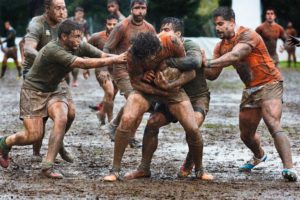
Photo by Quino Al on Unsplash
by Jenny Rose | Feb 12, 2022 | A Flourishing Woman, The Journey
I’ve written before about rewriting our personal narratives. I’m revisiting the idea, this time in terms of rewriting the past.
Pete Walker’s material on complex post-traumatic stress disorder suggests revisiting old traumas remaining in our memory as painful, nonhealing wounds, and rewriting. He talks about it in terms of time travel. One goes back, as an adult, into memories of childhood and enters the scene as a new character, creating a new and different narrative. Our adult selves can defend our child selves, shield them, help them explain themselves, provide comfort to them, and, if needed, remove them before whatever terrible experience occurred.

Photo by Angelina Litvin on Unsplash
Intrigued, I tried this method, and I was shocked, though I know the power of stories, at how well it worked and how much fun it was. Not only has it helped me heal from past trauma, it also strengthens my ability now to automatically stay on my own side and defend myself.
Seth Godin also talks about this concept. His language is “rewriting the script.” Same idea, slightly different presentation. Godin is business oriented, while Walker is psychology oriented.
Godin suggests, instead of saying to ourselves “here we go again,” we simply rewrite the script this time, which means we throw away our expectations and take each experience as a fresh one, rather than another terrible iteration of something in our past.
This is powerful for me as we navigate the process of moving house. I’ve done it more times before than I want to count, and I’ve always found it deeply traumatic, but this time is different. In spite of broken contracts, changing timelines, obstructions and reversals, and the usual financial and physical stresses, I’m managing to stay grounded and balanced. It feels like a rough patch, for sure, but I don’t feel traumatized. I have moments of amusement and even more moments of curiosity. What on earth will happen next? How will this all work out? Where will I be sitting in 6 months?
Old traumas and wounds are just that – old. We don’t have to insist new, similar experiences cut as deeply. It is a choice, although not an obvious one. We could just tear up our old scripts, the ones that hurt us, the ones that never work out for us, the ones filled with fear and heartbreak, and write a new one. Now does not have to be the same as then.
In yet another way to think about this, I came across advice from a writer on how to appreciate one’s progress. She, too, suggested time travel. If we feel stuck and as though we’re making no progress, and never have, and never will, and what person X told us way back when we were children, that we’ll never amount to anything, seems a curse we can never lift, we can sit quietly with ourselves and think back a year, or five, or ten. Stepping back helps us gain perspective and see exactly how far we’ve come, how much we’ve learned, how much we’ve grown. What if we went back, in imagination, to cheer on the self we were a year ago, whispering to them of all the wonderful progress ahead?
Scripts and storylines can be changed. We don’t have to give them our power. It’s so easy to forget that. It takes an act of presence and will to change the script and reclaim our power, but we can let go of our limiting expectations and beliefs and allow ourselves a different kind of experience. Not here we go again, but here’s a new experience – I wonder what will happen?
Sometimes all we need to do is shift our gaze from the hopeless and frightening places where we have no power and focus on the places we do. If we can stay there, rest there, live there, the chaos and tumult, though unpleasant, won’t knock us down and trample us. Such times pass by, pass over without traumatizing us, and we’ll come out on the other side more resilient than ever.

Photo by Leon Liu on Unsplash















